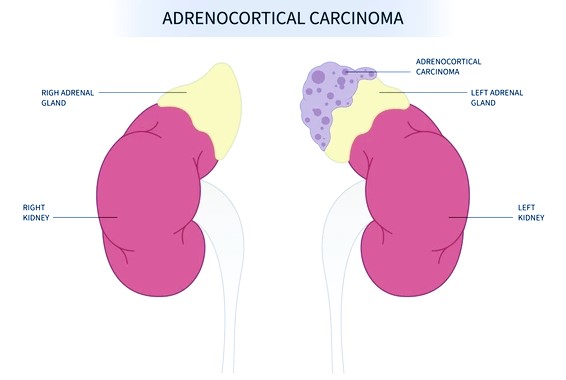Adrenocortical Carcinoma: Causes, Symptoms, and Treatments
Learn about Adrenocortical Carcinoma: its causes, symptoms, and treatments. Gain insights into this rare cancer and explore management options. Understand Adrenocortical Carcinoma today!


What is Adrenocortical Carcinoma and Its Causes?
Adrenocortical carcinoma (ACC) is a rare and aggressive form of cancer that originates in the cortex of the adrenal glands. The adrenal glands are small, triangular-shaped organs located on top of each kidney and play a crucial role in producing essential hormones such as cortisol, aldosterone, and androgens. These hormones are vital for regulating metabolism, blood pressure, and stress responses.
ACC is categorized into two types: benign and malignant. While benign adrenocortical tumors, such as adenomas, are non-cancerous and typically asymptomatic, malignant adrenocortical carcinomas are cancerous and can cause severe health complications. Malignant ACCs are particularly concerning due to their propensity for rapid growth and potential to metastasize to other parts of the body.
The exact causes of ACC are not well-understood, but research suggests several potential factors. Genetic mutations, particularly in the TP53 gene, are linked to the development of ACC. This gene is responsible for producing a protein that helps control cell division and prevent tumor formation. Mutations in TP53 can lead to uncontrolled cell growth, resulting in cancer.
Hereditary syndromes also play a significant role in ACC. Li-Fraumeni syndrome, for instance, is a hereditary condition associated with mutations in the TP53 gene and significantly increases the risk of developing various cancers, including ACC. Other genetic conditions, such as Beckwith-Wiedemann syndrome and multiple endocrine neoplasia type 1 (MEN1), have also been implicated in the development of adrenocortical carcinoma.
Environmental influences, though less well-defined, may contribute to the risk of ACC. These could include exposure to certain chemicals or radiation, though more research is needed to establish a clear connection.
The incidence rate of ACC is relatively low, with estimates suggesting it occurs in 1-2 per million people annually. It can affect individuals of any age but is most commonly diagnosed in adults between 40 and 60 years old. There appears to be a slight female predominance in ACC cases. Key risk factors include genetic predispositions, family history of related cancers, and certain hereditary syndromes.
Symptoms and Treatment Options for Adrenocortical Carcinoma
Adrenocortical carcinoma (ACC) presents with a diverse array of symptoms, primarily due to hormonal imbalances resulting from the tumor's activity. One of the hallmark presentations is Cushing's syndrome, characterized by excessive cortisol production. Patients with Cushing's syndrome may experience weight gain, particularly around the abdomen and face, hypertension, diabetes, and muscle weakness. Another significant symptom is virilization, where there is an overproduction of androgens, leading to masculinizing effects such as deepening of the voice, increased body hair, and irregular menstrual cycles in women.
In addition to these hormonally driven symptoms, ACC can also manifest through non-specific symptoms that often complicate the diagnosis. These include abdominal pain, which may result from the tumor's pressure on surrounding organs, unexplained weight loss, and persistent fatigue. Such symptoms can significantly impact the quality of life, causing physical discomfort and emotional distress.
Given the aggressive nature of ACC, treatment options are multifaceted and must be tailored to the individual patient's condition. Surgical removal of the tumor is often the first line of treatment and may be curative if the cancer is detected early and hasn’t metastasized. However, the complexity and location of the tumor can make surgery challenging.
For cases where surgery is not feasible or the cancer has spread, chemotherapy and radiation therapy are commonly employed. Chemotherapy can help to shrink the tumor and prevent further spread, while radiation therapy targets cancer cells in specific areas. Emerging treatments like targeted therapy and immunotherapy offer promising avenues by focusing on specific genetic markers of the cancer cells or boosting the body's immune response to fight the tumor.
The prognosis for ACC patients varies, heavily depending on the stage at which the cancer is diagnosed. Early detection is crucial; however, diagnosing ACC can be challenging due to its rare occurrence and the non-specific nature of some symptoms. Ongoing research and clinical trials are continuously exploring new treatment modalities, aiming to improve outcomes and offer hope for those affected by this formidable disease.
